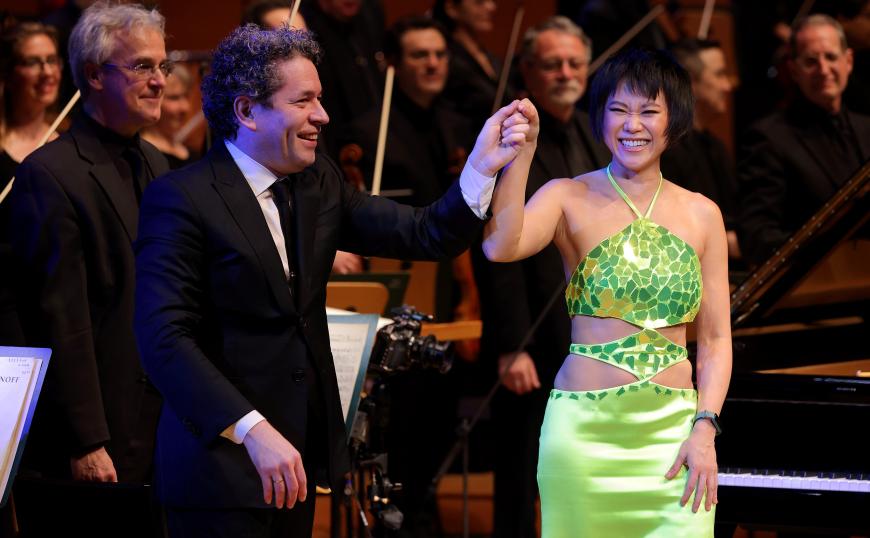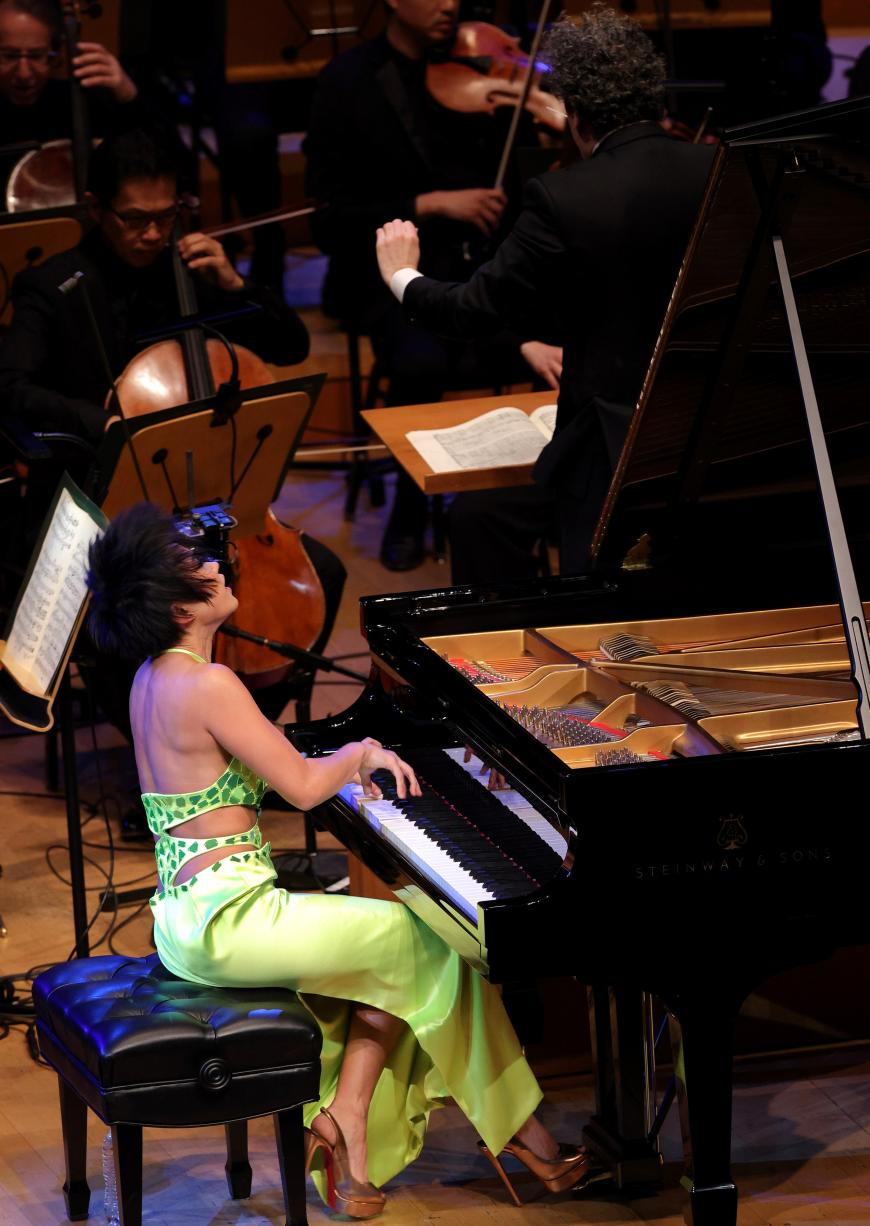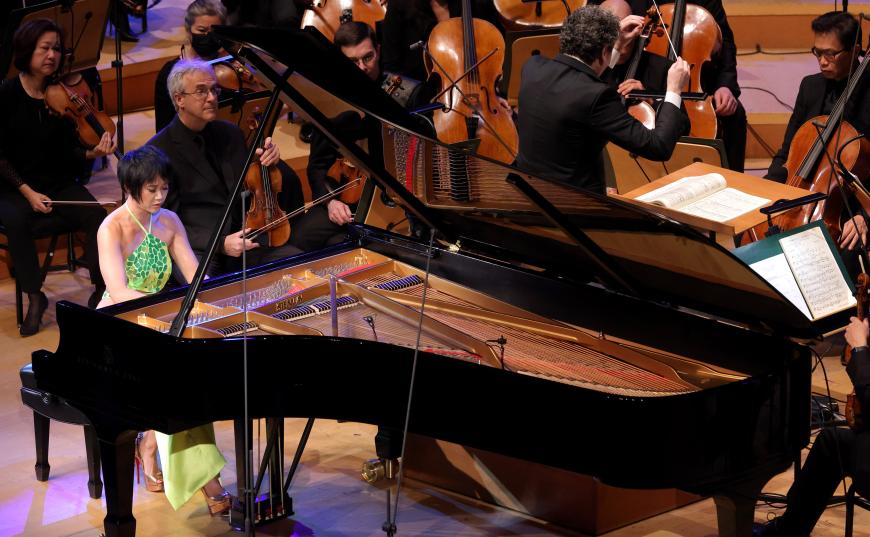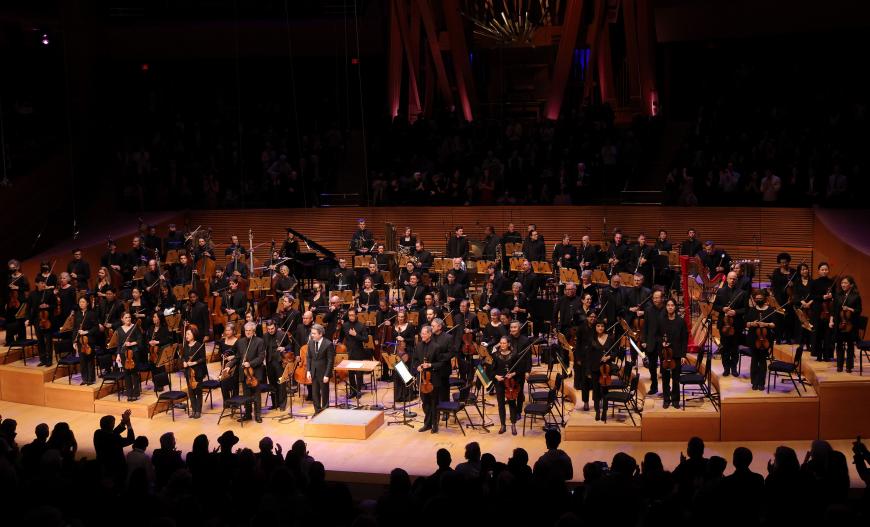
Life goes on at the Los Angeles Philharmonic — somehow.
No sooner had the LA Phil’s leader, Gustavo Dudamel, shook up the orchestral world last week by announcing that he was leaving for the New York Philharmonic in 2026 than the next big project was on the doorstep. It was a Sergei Rachmaninoff piano concerto cycle, linked to the worldwide observance of the composer’s 150th birthday this year — all four concertos, plus the Rhapsody on a Theme of Paganini, which is a de facto fifth concerto. Rachmaninoff’s Symphonic Dances and The Bells would be the companion pieces. The featured star pianist — the apparently indefatigable Yuja Wang.
For Yuja, this was an opportunity to go on a Rachmaninoff spree beyond the fantasies of mere mortals. First, she played the concertos with Yannick Nézet-Séguin and The Philadelphia Orchestra — the composer’s own favorite ensemble — performing Concertos Nos. 1 and 2 on Jan. 26 and Concertos Nos. 3 and 4 on Jan. 27, with the Paganini Rhapsody on both programs.

The next day, she, Nézet-Séguin, and the band took the whole show to New York’s Carnegie Hall, where she performed all four concertos and the Rhapsody from memory in one big gulp — with two 20-minute intermissions, two 10-minute pauses, four costume changes, and an encore. This is more of a stunt than a source of musical revelation — the likening of the event to scaling Mount Everest (“because it is there”) is apt — yet it seems to have gone well. Then she did the cycle all over again in Super Bowl-mad Philly on Feb. 4–5.
In Los Angeles, Yuja is on a more “relaxed” schedule — Concerto No. 1 on Feb. 9, the Rhapsody on Feb. 10, Concerto No. 2 on Feb. 11–12, Concerto No. 3 on Feb. 16–17, and Concerto No. 4 on Feb. 18–19. This time, the microphones and video cameras are out in force, with Yuja’s performances being captured on video for streaming and/or DVD and Blu-ray and all of the music on audio, presumably for Deutsche Grammophon, which has both Dudamel and Yuja on its roster.
Indeed, the L.A. music scene is in full Rachmaninoff mode. There were satellite programs happening in Beverly Hills — the city in which the composer made his final home at 610 Elm Drive — and the LA Phil Store had small windup music boxes for sale that tinkle the famous tune from the Rhapsody’s 18th variation when you turn the crank. No longer a figure of condescension, the swooning Romantic out of time and step with his contemporaries, Rachmaninoff is finally being taken seriously in the pantheon of greats, especially as his later, somewhat forward-thinking “American” compositions have been reexamined and performed more often.
Friday morning’s installment (Feb. 11) contained two of those late works. The Rhapsody on a Theme of Paganini, to be sure, has never been out of favor — prized for its whimsy, light touch, and transparency that reflect the neo-classical breezes blowing through American music then, with some darker corners suggested by the ominous “Dies irae” motif that Rachmaninoff often used. And — always — that big tune in the 18th variation, in which he turns Paganini’s diabolical theme upside down and ingeniously converts it into pure, luscious hyper-Romantic Rachmaninoff.

Yuja’s performance was a dazzler, all right, rattled off with fingers of fine stainless steel, thunder, and delicacy in detailed balance, with Dudamel and the Phil charging forward in often heated pursuit. She took a very slow tempo in the central passage where the first and second clarinets play a minor-key arpeggio in sequence — and she applied too much wayward rubato to the 18th variation, ironically lessening its emotional impact. (Listen to Rachmaninoff himself in his recording with Leopold Stokowski and The Philadelphia Orchestra — more straightforward but infinitely more affecting.) But Dudamel rescued it in the orchestral reiteration of the theme, steadying the tempo — and Yuja really ascended to another level from that point onward, turning on the technical brilliance to an almost unbelievable degree at the finish.
Naturally, the pianistic fireworks generated a mammoth ovation — and because Friday happened to be Yuja’s 36th birthday, Dudamel emerged at the curtain call to lead the orchestra in “Happy Birthday,” with the birthday girl banging out the last chords on the piano. The audience wouldn’t let her go, so Yuja returned to play one of her party pieces, a transcription of one of Art Tatum’s takes on “Tea for Two” in which she proved to have absorbed some pointers on playing wildly virtuosic stride piano. An awed Rachmaninoff used to venture into jazz clubs to hear Tatum play, so there’s the justification for that.

Symphonic Dances was Rachmaninoff’s final orchestral work — “That was probably my last flicker,” he ruefully said — and it was well linked with the Rhapsody on this program in that it too uses the “Dies irae,” in its third movement. The Phil has played this piece more and more over the last decade, most recently in 2021 with Susanna Mälkki in a tremendous performance that emphasized its modernity in clear, lucid detail.
Dudamel picked up the ball from there, and his more quickly paced performance added a degree of blatant thumping in the return of the theme of the first movement, maintained a suitably gliding lilt in the waltz-like second movement, and powered feverishly through much of the third. If asked to choose, I would prefer Mälkki’s performance over Dudamel’s, but the latter is the one that will go on record if anything is released.
As for the future of the LA Phil post-Dudamel, who knows for sure, but I have a feeling that the orchestra is going to go with someone, whether male or female, in their 20s. This has been the pattern — get ’em young, have ’em stay for a long time, and they emerge in the end as superstars. Given a roll call of figures like Zubin Mehta, Simon Rattle (principal guest conductor for 13 years), Esa-Pekka Salonen, and Gustavo Dudamel, it’s certainly paid off.




